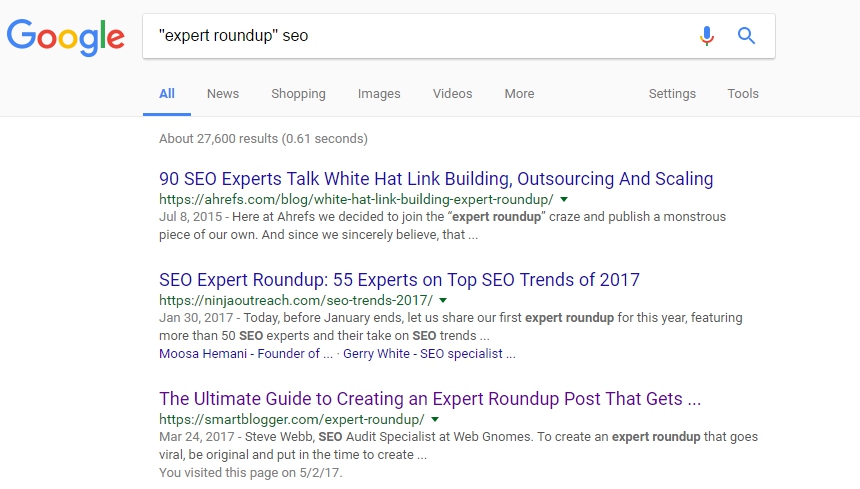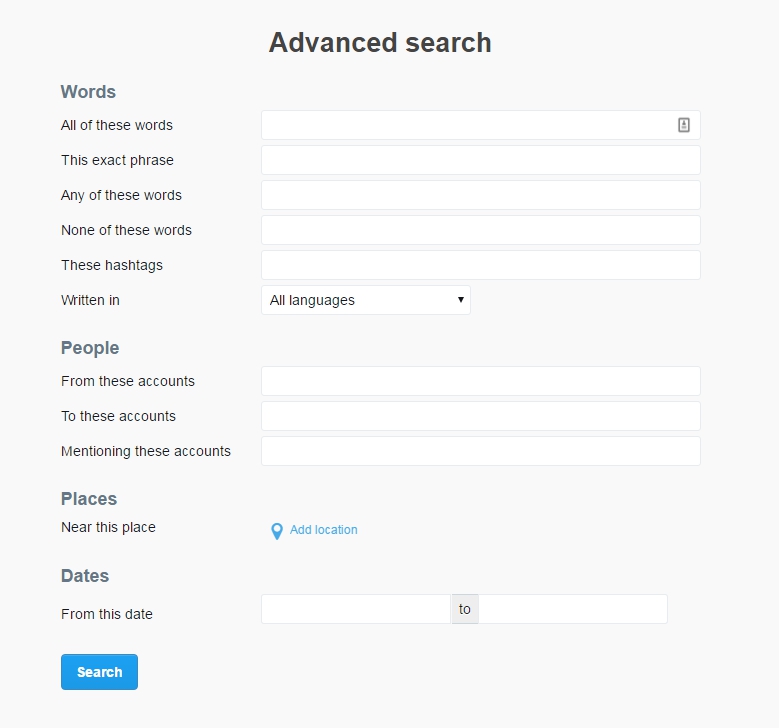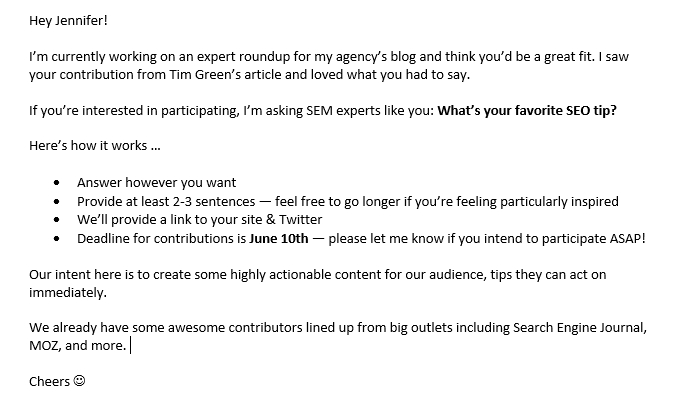Expert roundup articles are my absolute favorite link building strategy.
You ask a question. Experts, peers and influencers provide their answers. You piece it all together and have a piece of content that’s naturally designed to be sharable.
What’s not to like?
Well, maybe it isn’t quite so easy. A good expert roundup can take a lot of time and effort to produce.
Also, this type of content is hardly new. Some would even argue it’s overdone, with some going so far as to call for the death of expert roundups.
Although there’s no guarantee you’ll achieve spectacular results, using this guide to creating expert roundup articles will help increase your chances of success.
Step 1: Ask a Question
The first (and most important) decision you’ll need to make is what question or topic your expert roundup article is going to cover. Be warned: This will make or break your article.
There are a few critical considerations to factor into your decision:
- Topics/questions that are too complex are unlikely to elicit many responses.
- Topics/questions that are too niche can limit the number of potential contributors.
- Topics/questions that aren’t original can result in a lack of interested contributors.
I have one rule that I follow in this case: softball questions only.
In other words, choose something easy to ask your contributors.
It’s your job as the organizer to set contributors up for success — pitching them a softball topic/question gives them the best chance.
Also consider:
- What’s topical. Is there a new trend in your industry that deserves in-depth coverage?
- What people read and share the most. Is there a certain topic in your industry that always attracts a lot of attention? Take a fresh approach to it.
Here are some sample topics/questions to contemplate:
- How can I improve my SEO today?
- How will SEO change in 2018?
- What’s your favorite tool for SEO?
These are softball questions that invite all sorts of varied responses — perfect for an expert roundup article.
Step 2: Find Worthy Experts
This is the part I really love about expert roundup articles — making connections with people.
Writing an article can feel a bit like being marooned on an island. You’re isolated, single-handedly piecing together a survival raft. It’s a rather demanding challenge, to say the least, and you just might fail — your article might not find an audience and flounder.
Expert roundup articles are a different adversary. Instead of relying on your own resourcefulness, you have an entire community working together to build something truly unique. In the right hands, your chances of finding an audience greatly improve.
So where do you find these people?
Source #1: Expert Roundup Articles
It’s almost like cheating. However, chances are someone already grouped together a bunch of experts in a previous expert roundup article. Use it to your advantage.
There are a few reasons why I love this approach:
- There are dozens of potential contacts in one place.
- It’s fair to assume these people are willing to engage in expert roundup articles.
- There’s an abundance of existing expert roundup articles to sift through.
Do a Google search for “expert roundup” followed by your subject matter. Here’s an example below:

I just dug up over 100 potential experts for my article with one search. That’s just awesome.
While these articles are a veritable treasure map, use some common sense to save yourself time:
- Avoid dated articles. Contact info changes all the time and some people change industries.
- Avoid redundant articles or topics that too closely resemble your article’s chosen subject
- Keep it relevant. Don’t contact anyone who doesn’t closely fulfill your niche.
Source #2: Social Networks
It’s impossible to count how many awesome marketing people I’ve met over Twitter. Honestly, it would be a nightmare to even attempt an expert roundup article without it.
As effective as sourcing other expert roundup articles is for collecting potential contacts, recycling only gets you so far. For a truly fresh approach on virtually any subject, make sure to utilize social networks like Twitter to compile your experts.
Twitter’s advanced search makes this easy, allowing you to search for tweets (and their subsequent authors) explicitly discussing your topic.

Exercise some discretion here: Just because someone tweets about your topic doesn’t make them a great fit for your article. Do some vetting:
- Do they have a large following? This is a good mark of an influencer with something useful to add to the conversation. More importantly, they’ll likely share your article with their followers.
- Do they have a quality website? While it’s not always possible to tell from a Twitter bio, it’s a bonus. This opens the door to a potential link.
- Do they have something original to say? Expert roundup articles won’t be shared or receive many links if they’re full of recycled information. If your prospect isn’t tweeting anything original, move on.
Remember: The quality of your article depends on your ability to be discerning. Don’t treat your roundup as a numbers game. Make sure you only include people who have something useful to add to the conversation.
Organizing Your Experts
No matter where you source your experts, make sure you keep a spreadsheet to compile their information. Mine looks like this:

- Name: The contributor’s full name (double-check the spelling!)
- Email: Their email address (many people won’t list this)
- Twitter: Their Twitter handle, if available; note that I’ll highlight this section (red text) if this is their preferred method of contact vs email
- URL: The website they’re associated with (typically visible in their Twitter bio; some people might not have one)
- Date Contacted: The initial date I contacted them to invite them to participate in the article (this column would be blank to start)
- Participating: Whether I received a ‘yes’ or ‘no’ response from the contributor regarding their participation
- Contribution Received: Whether I received their actual submission for the article
Step 3: Contact Your Experts
This step will be easy if you organized your contact information. However, before sending anything out, you should know exactly what you’re going to say.
There are typically two camps that my potential contributors fall into, a designation which ultimately dictates my contact approach — whether they’re available through email or Twitter (or any other social channel you might be using).
The major difference between the two lines of communication is the amount of text available to make your pitch — Twitter being limited to 140 characters, outside of direct messaging.
Hopefully, you have a pretty good elevator speech ready to go. If not, I can help.
Contacting Experts: Twitter
I was very skeptical whether Twitter would be an effective outlet to pitch my expert roundup article. Limited to 140 characters in most cases, I wondered: Is that enough space to sell my idea to people outside my network?
The answer is yes — spectacularly so.
As it turns out, I’ve had way more success enlisting people for expert roundup articles over Twitter than any other method — including email.
I have a working theory as to why shorter pitches work better in this case: People are busy.
I don’t have the time to pore over your three-page document about why I’m a good fit for your article. I’m happy to give you a minute of my time if you’re genuine in your approach, however.
If you can’t direct message someone over Twitter (you must follow each other first), here’s a tweet that’s almost guaranteed to at least generate a response:

Nearly 2/3 of the people who received this message were interested and asked for more details, and nearly that same amount signed on to contribute to the article.
No matter how you utilize Twitter, following a few guidelines:
- Be respectful. Be polite and cordial, never be pushy.
- Don’t spam anyone. If you don’t hear back initially, move on. Contact these people over email if possible, not everyone is active on Twitter.
- Thank your respondents, even people who aren’t interested in participating. They may float future opportunities your way down the line or participate in other articles.
Twitter is great because it gives you a direct line to some of the biggest influencers and heavy-hitters in your industry. Just make sure not to abuse that power.
Contacting Experts: Email
You have a lot more room to play with when contacting experts over email, but it still pays to be conservative in your approach. Avoid fluff — personalize your email and provide the basic details.
Here’s a recent email I sent out:

I’m constantly trying to perfect how this email looks but I’ve experienced success using this approach.
Here are a few guidelines:
- Provide personalization: Nobody wants to receive a mass email. Take the time to court your expert by adding some personalization. Mention where you found their info or even quote something they wrote that jumped out to you. Stroke their ego a bit.
- Provide basic instructions: Tell contributors exactly what you’re looking for; don’t be vague.
- Provide incentive: Are you linking to their site? Are you publishing the article on a major outlet? Tell them why it’s worth the trouble.
- Provide a deadline: While this is mostly arbitrary, give your contributors an initial deadline so they’re compelled to act on their submissions.
Obviously, you can word this email however you want. It can help to shamelessly namedrop any major influencers who already agreed to participate. There’s an element of salesmanship involved here.
Keep whatever you put together to the side as a template for your email, making sure to personalize each version per contact.
Step 4: Edit/Finalize Submissions
Make sure to refer to your earlier contact sheet and record the information as the responses roll in.
Is this person participating? Make a note of it.
Did this person send you their actual submission? Make a note of that, too.
Keep a running doc with all the contributions you received and start the editing process. If you notice any major errors, this is the perfect time to reach out to contributors and ask for clarification — don’t wait until your deadline.
Inevitably, you’ll encounter people who agreed to do your article who don’t send you their submission. If you haven’t heard from these people by the deadline, make sure to follow-up.

I always ensure my initial deadline is arbitrary from my end — I’m not beholden to this deadline for publishing. Having this flexibility allows me to follow-up with anyone late to the party and provide a second deadline for submissions.
Send a friendly and short reminder to your contact over their preferred channel (email or social) and offer an extension. Most people will provide their submission that day or accept the new deadline.
In the interest of my own time, if I don’t receive the submission by the second deadline, I won’t bother contacting them again.
Make sure to continue editing your responses while you wait for final submissions. If you’ve finalized the publishing date for your article, this is also a great time to let your experts know.
Step 5: Publish & Promote Your Article
The beauty of an expert article is your content is already accounted for, although you may consider putting a personal touch on it. Add your own tip or write an introduction/conclusion. This is an opportunity to showcase your own expertise as well.
In any case, with the content finalized, your most important task is promoting your article. The link to your published article is the key here — send this directly to your experts.
I typically include a short note to accompany the link, thanking each contributor for their submission. If you want to go the extra mile — and make more genuine connections — add some personalization. Pull out a short quote from their submission and mention why you liked it. People love feedback.
While my goal in creating an expert roundup article is to ultimately receive shares and backlinks, I find it a little taboo to explicitly ask for this. Instead, I feel there’s a little more tact in simply “greasing the wheels” a bit. I strongly encourage my experts to share the article, making sure to mention backlinks aren’t necessary but greatly appreciated.
Most digital marketing people understand how this process works and will be happy to return the favor in the form of a link for the free exposure you provided them — no need to force the issue.
Put a little more muscle into your promotional efforts with some paid advertising — see if you can gain any traction on avenues like Facebook, LinkedIn, or even niche areas of Reddit. If you’re confident the content of your article provides something useful to your audience, it’s worth the investment.
Conclusion
Expert roundup articles are a great way to build dynamic content and expand your professional network. While it does take work, this guide should make the process of creating your own expert roundup articles much easier.
Image Credits
Featured Image: Pexels
Screenshots by Tyler Thursby. Taken May 2017.





